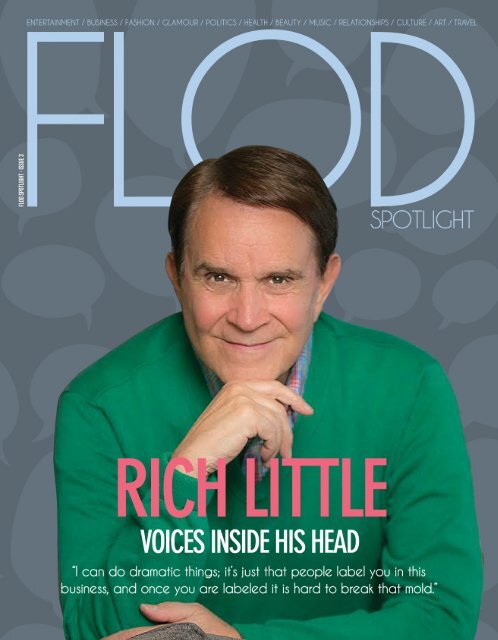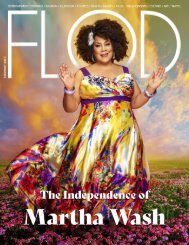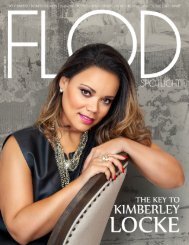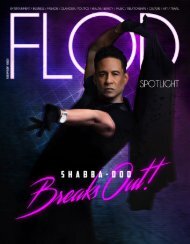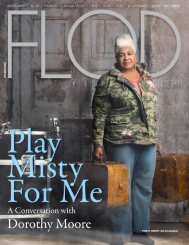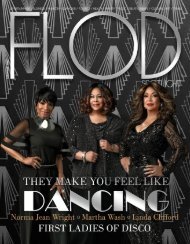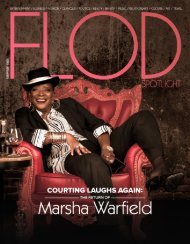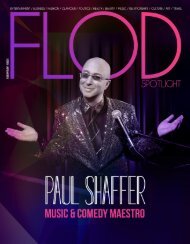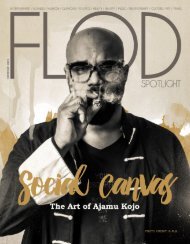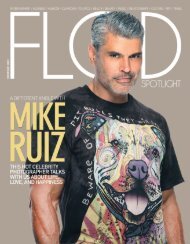FLOD Spotlight - Issue 3
Rich Little: Voices Inside His Head Interview
Rich Little: Voices Inside His Head Interview
You also want an ePaper? Increase the reach of your titles
YUMPU automatically turns print PDFs into web optimized ePapers that Google loves.
COVER STORY | RICH LITTLE<br />
“Politicians just say what<br />
they want to do, but they<br />
don’t go into details. I<br />
work with that. If Hillary<br />
goes against Donald<br />
Trump, I’ll have a wealth<br />
of material.”<br />
RICH LITTLE<br />
MISTER PERSONALITIES<br />
By James Arena<br />
With a staggering repertoire that boasts in excess<br />
of 200 voices, Rich Little is the undisputed master of the<br />
imitation game. For decades, the actor and comedian<br />
has been channeling the biggest and brightest stars<br />
of Hollywood, politics and pop culture, entertaining<br />
audiences on countless vintage and contemporary<br />
television programs and on stages throughout the US<br />
and Canada. Reflecting on his secret for recreating the<br />
sounds and styles of the stars so expertly, Little admits,<br />
“Knowing the person personally is not important; it’s<br />
knowing the speech patterns and mannerisms [in<br />
order] to imitate the person the way the public sees<br />
him.” Whatever his formula may be, his skills continue<br />
to earn him accolades (and soldout shows) throughout<br />
the continent, including in the high-energy confines of<br />
Las Vegas, where the artist performs regularly.<br />
If imitation is indeed the sincerest form of flattery, Rich<br />
Little is a man proficient at serving up a compliment.<br />
And thanks to him, the voices and personalities of our<br />
favorite stars continue to be heard and enjoyed in a<br />
delightfully unique and enduring way. He sits down<br />
with <strong>FLOD</strong> to talk about how he’s managed the voices<br />
of celebrities to whom he’s played host.<br />
Rich, tell me a little about your youth and when<br />
you discovered your talent for imitating the<br />
voices of Hollywood’s golden stars.<br />
“I grew up in Canada, in Ottawa – the capital city. As a<br />
kid I was really into radio because you made your own<br />
pictures when you listened to it. I had a wild imagination.<br />
I would go to bed at night and put the radio under the<br />
covers so my folks wouldn’t see me listening at 11 P.M.<br />
I always had a fascination with entertainers and movie<br />
stars. When I started doing impressions it began as a<br />
hobby to amuse my friends. When I started to make<br />
some money at it, I looked at it differently. But until I did<br />
that it was just fun. I never believed I would one day<br />
get to meet these people and get to know them. That’s<br />
probably been the biggest thrill of my life.”<br />
Do you recall the big turning point when you<br />
made the leap into a professional entertainment<br />
career?<br />
“I started out doing [my act] in Canada at coffee houses<br />
and small venues, and then I did a television show in<br />
Toronto with Mel Tormé. We became great friends.<br />
He was going to work for Judy Garland as a musical<br />
arranger for her TV show, and he made a tape of me<br />
doing my impressions and played it for her. She didn’t<br />
seem to be too interested. She wasn’t thrilled with it<br />
until I did my impression of James Mason, who made<br />
the movie A Stars Is Born with her. She asked Mel to<br />
play that part again, and he did. She told him to book<br />
me on her show. [He laughs.] It’s so funny – about 15<br />
or 20 years later I met James Mason and thanked him<br />
for getting me on The Judy Garland Show. He didn’t<br />
know what I was talking about. I told him I got on the<br />
show because I imitated him. [Little uses Mason’s<br />
haughty vocal style.] ‘What on earth for?’ he said, and<br />
walked away.<br />
“Judy wasn’t thrilled with impersonators, but when I<br />
finally did her show, her reaction was just incredible.<br />
That’s what made that spot so appealing. If you see<br />
the clip (I think it’s out on DVD or on YouTube), you<br />
can see her reacting. She never came to rehearsals,<br />
so what you are seeing was her reaction to seeing me<br />
for the first time. It was pretty astounding.”<br />
That’s really quite something to have been a part<br />
of her legendary show. What are your observations<br />
about Ms. Garland and working with her?<br />
“I thought she was a very lonely person and a bit neurotic<br />
and had problems when we shot that show. She wouldn’t<br />
come out of her dressing room. Of course I didn’t know<br />
what was going on at that point. I thought they were just<br />
having technical problems. As I found out later, she was very<br />
insecure, and she was drinking a lot. But she was very nice<br />
to me – extremely nice, actually. I only have great memories<br />
of her, but I found out later she had her problems. Also on the<br />
show was [actor] Peter Lawford, and he was a train wreck<br />
too. We didn’t finish shooting that show until about 3:30 or<br />
four in the morning.”<br />
You mentioned that Judy didn’t care for<br />
impersonators. Did you encounter stars who didn’t<br />
like to be imitated by you, perhaps because it drew<br />
attention to things about their personalities they<br />
may have wanted to suppress?<br />
“Oh yeah, I’m sure it was [that way] with a few people.<br />
What you’re doing in an impression is pointing out their<br />
idiosyncrasies and some of their flaws – a lisp ora voice that<br />
was too high for example. Sometimes they’re not too thrilled<br />
about it. I’ve had many people say to me ‘that doesn’t sound<br />
like me at all,’ with their family standing behind them going<br />
‘yes it does.’ Sometimes the person you are doing doesn’t<br />
really hear themselves.<br />
“But most people are flattered that I imitated them. The only<br />
person that I remember being really annoyed was [comedian]<br />
Paul Lynde of The Hollywood Squares. I’m not telling you<br />
something that probably isn’t well know, but he was an<br />
<strong>FLOD</strong> SPOTLIGHT | ISSUE 3 | FIRSTLADIESOFDISCOSHOW.COM 3
alcoholic. He had a lot of<br />
demons. For some reason<br />
he didn’t like my impression,<br />
and when they’d come to him<br />
on The Hollywood Squares,<br />
he’d say [Rich uses Paul’s<br />
distinctive, tumbling voice],<br />
‘Who’s he doing? Who’s<br />
that supposed to be? Oh,<br />
that stinks!’ That’s kind of<br />
funny. [Rich laughs again.]<br />
I’ve got a few clips from a<br />
Dean Martin roast where I’m<br />
doing Paul, and Paul looks<br />
like he’s sucking on a bad<br />
lemon. He was never thrilled<br />
with it.<br />
“A lot of people think Richard<br />
Nixon was someone who<br />
wouldn’t like my impression,<br />
but that wasn’t true at all.<br />
However, when I did Nixon<br />
one time in front of him, he<br />
didn’t know I was doing him.<br />
He turned to his wife and<br />
said [Little shifts to Nixon’s<br />
distinctive vocal style] , ‘Why<br />
is this young man speaking<br />
in this strange voice?’ Nixon<br />
was a little square. He<br />
didn’t have a great sense<br />
of humor. I still do him in my<br />
show. He used to force a<br />
smile. He’d wear that same<br />
black suit like every day of<br />
his life. I don’t think he took<br />
the hanger out of it either. He<br />
was a bit stiff. Some people<br />
don’t get the humor.<br />
“I did 23 of Johnny Carson’s<br />
mannerisms on another<br />
Dean Martin roast and what<br />
they all meant. I got a great<br />
reaction from the crowd.”<br />
I’m curious. As a<br />
vintage film fan and<br />
with all the stars you’ve<br />
impersonated, what are<br />
some of your favorite<br />
movies?<br />
“Oh, Best Years of Our Lives<br />
and It’s A Wonderful Life.<br />
Casablanca - the classics,<br />
you know.”<br />
COVER STORY | RICH LITTLE<br />
You must indulge me<br />
for this next question.<br />
As a seven-year-old kid,<br />
I was hypnotized by<br />
the show The Flying<br />
Nun with Sally Field.<br />
I can’t explain that. It<br />
was a unique show for<br />
you because you didn’t<br />
do impressions – you<br />
played a character<br />
named Brother Paul.<br />
What do you recall<br />
about doing this ’60s<br />
sitcom?<br />
“It was great. If you look<br />
at it today it’s a little bit<br />
corny – a nun flying? But it<br />
was popular at the time. I<br />
played an accident-prone<br />
priest, kind of a Clouseau<br />
of the monastery. It was an<br />
interesting character. They<br />
could have done a spinoff<br />
of the character – they<br />
talked about that but never<br />
did it. I did three or four<br />
episodes, and it was great<br />
fun. You could see Sally<br />
Field’s potential. She was<br />
very skilled and a very good<br />
actress. She still is.<br />
“The Flying Nun was on for<br />
about three season. That<br />
was a pretty good run. I did<br />
a situation comedy show<br />
that only lasted one year<br />
called Love On A Rooftop<br />
(1966-1967), which nobody<br />
remembers. But you have<br />
to have been on a few years<br />
for people to remember. If<br />
you’re only on one season,<br />
it’s usually forgotten.”<br />
What was it like in<br />
Hollywood at that time?<br />
You were working in (at<br />
least for people of my<br />
generation) that cool,<br />
kooky period of late ’60s<br />
and early ’70s comedy/<br />
variety television. The<br />
shows of that period<br />
are the ones many<br />
people seem to lovingly<br />
remember and still<br />
today.<br />
“Yes, I agree. It was a great<br />
time to be a comedian. There<br />
were so many variety shows<br />
on TV. I went from one to<br />
another – Flip Wilson, Glen<br />
Campbell, Carol Burnett.<br />
I was working almost<br />
every week at that time –<br />
Hollywood Palace and The<br />
Tonight Show. Then I did<br />
Mannix and Police Woman,<br />
playing real characters. Yes,<br />
it was a great time for me.”<br />
Was it difficult to<br />
maintain a personal life<br />
with so much going on<br />
for you in Hollywood?<br />
“Yes, it was very difficult.<br />
That’s why my first marriage<br />
didn’t last. I was never home.<br />
I was working all the time,<br />
and I didn’t spend enough<br />
time with my wife and my<br />
daughter. My daughter and<br />
I are very close today, but<br />
that was a busy time for me<br />
– the ’70s. I mean, I was<br />
doing those Dean Martin<br />
roasts constantly – I did 24<br />
of those.”<br />
The roasts brought<br />
together an eclectic<br />
range of comedians,<br />
from Sammy Davis to<br />
Don Rickles. Would you<br />
describe these programs<br />
were edgy for their time?<br />
“Yes, they definitely were. I’d<br />
say they were a little racist,<br />
actually. They did jokes you<br />
couldn’t do today. There were<br />
a lot of people who performed<br />
on the show but they [had to<br />
be cut out] and were never<br />
seen on the air. There was<br />
no profanity, though.<br />
“But the amazing thing about<br />
the shows was how well they<br />
were edited. I was there, and<br />
I know what went on. I can<br />
see they took people out,<br />
used laughter from other<br />
shows and other people and<br />
spliced it all together. They<br />
are really shows comprised<br />
of bits and pieces. Some of<br />
the roasts, the people [being<br />
roasted] weren’t even there.<br />
But you didn’t know that.<br />
They would do their shots in<br />
the studio with nobody there<br />
if they couldn’t get them<br />
to come to Vegas, where<br />
we shot most of them. Like<br />
Ronald Reagan. They did an<br />
excellent job with him.<br />
Wasn’t it a bit difficult to<br />
do your act without the<br />
featured guest there?<br />
“You just pretended that the<br />
star was sitting there. I did<br />
one with John Wayne, and<br />
they just put him in [with<br />
clips] from another show,<br />
showing him laughing. It<br />
looks good. You had to go<br />
along with it.”<br />
Let me ask about your<br />
craft. You are essentially<br />
playing a role when<br />
you imitate these stars,<br />
mostly in a comedic<br />
manner. Did you ever<br />
want to utilize your<br />
abilities for more serious<br />
roles?<br />
“By way of example, take<br />
Bryan Cranston, who did<br />
the movie Trumbo. Bryan is<br />
such a skilled actor. He’s a<br />
wonderful man and brilliant.<br />
If you watch him in that film,<br />
he’s actually doing a brilliant<br />
impression of [screenwriter]<br />
Dalton Trumbo, but nobody<br />
knows what he sounds like.<br />
Yet everybody says, ‘Yeah,<br />
I guess that was him.’ (They<br />
have other people in the<br />
COVER STORY | RICH LITTLE<br />
movie, like somebody playing John Wayne or Edward G.<br />
Robinson. I thought they were kind of weak.) Bryan studied<br />
the body language and mannerisms more than Trumbo’s<br />
voice. It’s interesting. He isn’t an impersonator, yet he plays<br />
real people. He could be the male equivalent of Meryl Streep.<br />
“I’d like to do that, too. There’s been a few movies made<br />
with people doing Nixon or Reagan, and I sat there thinking,<br />
‘Gosh, I wish I had done that.’ But it’s hard for me because<br />
people think of me in a comedic way. So they think I can do<br />
Nixon in a funny way, but they think they need someone else<br />
to do it in a serious way. But that’s not true. I can do it in a<br />
serious way.<br />
“I had a show not long ago where I performed for a gathering<br />
of Republicans. I read Reagan’s farewell speech to the<br />
nation where he told them he had Alzheimer’s disease.<br />
There wasn’t a dry eye in the house. Nothing comical about<br />
it. I can do dramatic things; it’s just that people label you in<br />
this business, and once you are labeled it is hard to break<br />
that mold.”<br />
Your voice, I imagine, is something like a dancer’s<br />
legs or a sculptor’s hands. I would think you’ve had<br />
to be very conscious of protecting it. What has that<br />
been like?<br />
“Oh wow, that’s been a battle for years. Once in a while I get<br />
laryngitis, or I get a cold with coughing. That makes it really<br />
hard to perform. I am working at the Tropicana here in Vegas<br />
five nights a week, and whether you feel good or not, the<br />
show goes on. So what you do is get through illness as best<br />
you can. You may be like, ‘Oh God, that was terrible,’ but the<br />
audience cordsdoesn’t realize how well you could have done<br />
it. I know that when I have a cold, some voices are improved,<br />
but a lot are harder to do.<br />
“I talked about insuring my voice at one point, but it cost so<br />
much it was ridiculous. (I have had a doctor look at my vocal<br />
cords to see if they looked different from anybody else’s, but<br />
they were normal.)”<br />
You are well known for your imitations of the stars of<br />
classic Hollywood. How much do you have to work on<br />
keeping up with contemporary personalities as your<br />
audiences change?<br />
“Well, keep in mind I generally appeal to an older audience.<br />
But in my shows I do Trump, Ted Cruz, Ben Carson to keep<br />
it up to date. But I’m known for Johnny Carson, Nixon and<br />
Ronald Reagan.<br />
“I had a 15-year-old kid in my audience the other night,<br />
and he was laughing hysterically. But I thought he probably<br />
didn’t really know who I was doing. I asked him if he enjoyed<br />
the show, and he said it was fabulous. But he was a little<br />
confused. [Rich laughs.] He wondered why I kept changing<br />
my voice – [so I knew] he didn’t know any of the people. But<br />
yeah, I have young people see my show and say they got<br />
about six out of the 30 impressions I did. You know? But if<br />
they are over 30 and don’t know who Ronald Reagan and<br />
Nixon are, they must be living in a tree fort. Younger people<br />
don’t really care about the past – they just have to get the<br />
humor and laugh at the jokes, like this 15-year-old.”<br />
If you look at shows today like Saturday Night<br />
Live, imitations are done rather roughly, satirically.<br />
It’s not the detailed level of impersonations you<br />
have honed so successfully. Is your art form<br />
disappearing?<br />
“<br />
A lot of people think Richard<br />
Nixon was someone who wouldn’t<br />
like my impression, but THAT<br />
wasn’t true at all.<br />
PHOTOS: Rich Little Productions, Inc.<br />
4 <strong>FLOD</strong> SPOTLIGHT | ISSUE 3 | FIRSTLADIESOFDISCOSHOW.COM <strong>FLOD</strong> SPOTLIGHT | ISSUE 3 | FIRSTLADIESOFDISCOSHOW.COM 5
COVER STORY | RICH LITTLE<br />
COVER STORY | RICH LITTLE<br />
“Well, yes, it has kind<br />
of disappeared. I do<br />
impressions and tell jokes<br />
and punchlines. Most comics<br />
today do observational<br />
humor. [Today’s comics]<br />
don’t tell jokes – they just<br />
talk about situations. It’s<br />
a whole different type of<br />
comedy. Today, you’ll see a<br />
lot of comics come out, and<br />
they have no real prepared<br />
material, so they end up with<br />
‘how are you feeling tonight’<br />
and ‘where are you from?’<br />
They hope to get lucky by<br />
talking off the cuff. That’s<br />
tough to do. I think only Don<br />
Rickles and Robin Williams<br />
were [among the few who<br />
were] successful at doing<br />
that.<br />
“I saw a comic the other<br />
night. He was funny, but<br />
he used the f-bomb like 18<br />
times. The young people<br />
accept it, and they are doing<br />
it on commercial television<br />
now, saying anything they<br />
want. I remember doing<br />
The Tonight Show, and they<br />
bleeped me when I said,<br />
‘damn.’ That kind of raw, talk<br />
any way you want to type<br />
of comedy is what many<br />
young people want. I’m sure<br />
there are a lot of people who<br />
don’t like it at all – but those<br />
are people who don’t go to<br />
nightclubs.<br />
“I think it’s a cheap way to<br />
get a laugh; I really do. It is<br />
kind of a shock thing, yeah.”<br />
Your artistry has<br />
remained popular<br />
through many decades.<br />
Is there an element in<br />
your creativity that has<br />
helped you achieve such<br />
longevity?<br />
“Doing a lot of impressions<br />
that weren’t done by a lot<br />
of other people — including<br />
politicians. And observing<br />
what was going on in<br />
the news [in my act] and<br />
staying fresh. I’m constantly<br />
updating my show, but<br />
there’s no question about<br />
it – people want me to do<br />
Johnny Carson, Jimmy<br />
Stewart and John Wayne.<br />
“I enjoy thinking up new<br />
material and new jokes.<br />
Taking something that’s<br />
been said by someone<br />
notable or a fact and making<br />
it funny. For example, you<br />
[work with] something like<br />
Donald Trump, who talks all<br />
day about building a wall and<br />
how the Mexicans are going<br />
to pay for it. But he doesn’t<br />
say how big the wall will be<br />
or how the Mexicans will<br />
pay for it – and that’s what<br />
the public wants to know.<br />
Politicians just say what they<br />
want to do, but they don’t<br />
go into details. I work with<br />
that. If Hillary goes against<br />
Donald Trump, I’ll have a<br />
wealth of material.”<br />
What’s your measure of<br />
satisfaction today?<br />
“I finally figured out what<br />
people want to hear. I love<br />
writing something that really<br />
works and having my show<br />
go over really well. When,<br />
after the show, people are<br />
commenting how good it<br />
was – that’s very rewarding<br />
and makes me pleased<br />
because I write everything<br />
myself. I don’t rely on<br />
writers anymore. (In the<br />
early TV days, you worked<br />
with writers. On the roasts,<br />
they gave you writers. They<br />
wrote your routine and you<br />
could use it or try something<br />
on your own. But everybody<br />
had something prepared for<br />
them, I think. Except Don<br />
Rickles, Jonathan Winters,<br />
Charlie Callas and Foster<br />
Brooks.)”<br />
Tell me about the next<br />
big goal you’ve set for<br />
yourself ?<br />
“Well, I have a book coming<br />
out about my career called<br />
Little By Little - People I<br />
Have Known And Been.<br />
I’ve been working on it for<br />
almost 20 years, and we’re<br />
almost there with it. It’s all<br />
about the great memories I<br />
have of the people I worked<br />
with. When I think about all<br />
this – you gotta realize to get<br />
on TV today, you have to be<br />
younger. You have to have<br />
something [significant] to<br />
promote, or they don’t want<br />
you. You realize that. Thirty<br />
or 40 years ago, I got on TV<br />
because I was funny. I did the<br />
David Letterman show about<br />
10 years ago, and it was the<br />
highest rated show of the<br />
season. But they wouldn’t<br />
have me back unless I was<br />
promoting a book or was in a<br />
movie. So maybe when my<br />
book comes out, I’ll be back<br />
on the talk show circuit.”<br />
I know you are a<br />
supporter of Wounded<br />
Warriors. What drew<br />
you to the plight of<br />
veterans?<br />
“These soldiers have put<br />
their lives on the line in tough<br />
places like Afghanistan,<br />
left their families and come<br />
home with no legs or other<br />
extremely challenging<br />
difficulties. They should<br />
be looked after for the rest<br />
of their lives. There’s no<br />
question - God, what they did<br />
for us? They are strug-gling<br />
to get medical attention,<br />
dealing with trauma and<br />
all kinds of psychological<br />
problems. I hope the next<br />
president really [addresses<br />
these issues]. That would<br />
make me very happy.”<br />
Is there a special<br />
highlight in your career<br />
thus far that has really<br />
stayed with you?<br />
“Yeah, probably my<br />
association with Ronald<br />
Reagan. That’s been the<br />
most rewarding, and it<br />
has given me the most<br />
satisfaction. I was able to<br />
get to know him personally<br />
and perform for him so<br />
many times. I considered<br />
him a friend. He had a<br />
great sense of humor. He<br />
always wanted to tell you<br />
a joke or hear one. Always<br />
interested in what you were<br />
saying or doing. He wasn’t<br />
terribly presidential, more<br />
like a lovable grandfather.<br />
Everybody loved him, and<br />
he had so much charisma.<br />
That was a great time for<br />
me, you know? I’ve had a<br />
number of them. Getting<br />
to know these icons and<br />
knowing them on a social<br />
level has been a great thrill<br />
for me – like Jimmy Stewart;<br />
we were very close. Yeah, I<br />
have some great memories.”<br />
For more information on<br />
Rich Little, visit his site<br />
www.richlittle.com<br />
6 <strong>FLOD</strong> SPOTLIGHT | ISSUE 3 | FIRSTLADIESOFDISCOSHOW.COM<br />
<strong>FLOD</strong> SPOTLIGHT | ISSUE 3 | FIRSTLADIESOFDISCOSHOW.COM 7
Hollywood Flashback<br />
with Rich<br />
Mr. Little gives his off-the-cuff observations of some classic personalities<br />
in entertainment.<br />
Johnny Carson<br />
Ed Sullivan<br />
“Best talk show of all time. A great listener and a very<br />
intelligent man.”<br />
Dean Martin<br />
“Lackadaisical, lovable, didn’t really care about<br />
anything but playing golf and watching old westerns<br />
– but loved by everybody.”<br />
Frank Sinatra<br />
“Cold, egotistical, not very friendly, nice in a<br />
social circle, but as an entertainer – very difficult<br />
to get along with. A man who could count up to<br />
three and get two of the numbers wrong, you<br />
know?”<br />
Angie Dickinson<br />
“Great, just great. Down to earth, sweet and<br />
very talented. A doll!”<br />
“Very complex, very moody. If you hit him on a nice<br />
day, he was the nicest man in the world, but on a bad<br />
day – you better be out of town. He was very kind<br />
and nice to me.”<br />
Julie Andrews<br />
“Very professional, a little bit prudish, but a good<br />
sense of humor. Still, she didn’t want to be known as<br />
Mary Poppins – she didn’t like that squeaky clean<br />
image.”<br />
Don Rickles<br />
Mary Tyler Moore<br />
“I didn’t do her show, but I used to live next door<br />
to her in Malibu. Very pleasant, very easy to<br />
talk to, and she was very clever in putting other<br />
talented people in her show. They may have<br />
taken a bit away from her, but she loved that.<br />
She let other people shine.”<br />
Carol Burnett<br />
“Just like Mary. If you were a guest on her show,<br />
she let you do what you wanted to and shine.”<br />
“Still funny. Quickest mind of all time. If you accepted<br />
what he did – some people were insulted – he was<br />
absolutely brilliant.”<br />
Lucille Ball<br />
“Very, very professional. Boy, you had to know<br />
what you were doing with her. Whoa! She appreciated<br />
it if you knew your lines and did what<br />
you were told – then she was very nice. But if<br />
you were goofing around, she could<br />
cut you down!”<br />
Why did you decide to<br />
reinvent The Ritchie Family?<br />
The simple answer is that we never<br />
stopped loving our profession and<br />
the desire to reconnect with our<br />
fans. For most of our lives, many of<br />
our hopes and dreams have been<br />
intertwined with our music career and<br />
leaving the music scene as we did<br />
was heartbreaking. Consequently, we<br />
consider the reinvention of The Ritchie<br />
Family (TRF) as unfinished business<br />
for us.<br />
Our initial run as The Ritchie Family<br />
was short-circuited, causing us to<br />
feel as though the rug was literally<br />
pulled from beneath us. The<br />
contentious relationship we had<br />
with TRF management collapsed<br />
after numerous disagreements and<br />
opposing visions. Later, Cassandra<br />
and Cheryl, who sang background<br />
vocals for John Lennon and Yoko Ono<br />
and who were anticipating going on<br />
tour with them, were devastated by<br />
John’s tragic death. For a long time<br />
after that we thought our music career<br />
was over and turned our attention to<br />
other non-music careers and pursuits.<br />
However, the dream never died; and,<br />
after many years, we came together<br />
again to reform TRF and to reestablish<br />
our music career.<br />
We have had to overcome several<br />
obstacles and setbacks in order to<br />
resume our career as The Ritchie<br />
Family, including acquiring the<br />
ownership of our name. We have<br />
continued to persevere because of our<br />
love of music, our fans, and this career<br />
we have chosen. We know we still<br />
have a lot to offer and plan to give this<br />
new opportunity our best shot.
How do you see yourselves bridging your<br />
disco legacy with today’s music?<br />
There is a misconception about the word “disco” by some.<br />
Disco music is dance music and good dance music never<br />
goes out of style. It is timeless and we believe a good<br />
song will go a long way toward bridging the gap between<br />
yesterday and today. “Ice” is that song for us.<br />
Although we believe our TRF legacy is wonderful, we also<br />
recognize the need for a blend of the old with the new.<br />
As part of our concert line-up, we perform songs from our<br />
repertoire that are considered legacy TRF songs, i.e., The<br />
Best Disco In Town, Brazil and Quiet Village. We also add<br />
current music to round out our show.<br />
TRF’s sound easily blends with today’s music. TRF’s strong<br />
and exciting harmonies, coupled with the unique beats<br />
and the syncopated rhythms of today, are a long-awaited<br />
and welcome change for our fans and us. We expect to<br />
introduce our new fans to a genre of music that has been<br />
under-appreciated and our current fan base to the new and<br />
improved TRF.<br />
Why was “Ice” the right song for you?<br />
“Ice” is a song that has universal appeal. Our audience<br />
has always been diverse and inclusive. People of many<br />
backgrounds and ethnicities appreciate our music. The concept<br />
of melting the ice makes us think about breaking down barriers<br />
and letting in the light to reveal our better, brighter selves.<br />
We envision TRF bringing more new and exciting music to<br />
the scene in the future. In addition, we also believe TRF<br />
is an example and a beacon to all who dream of attaining<br />
deferred goals, but think it is too late. We believe it is never<br />
too late to go for your dreams and that we must always be<br />
“ready for the sun” to shine. Ultimately, we will bring our<br />
new and vibrant sound, along with a message of hope for<br />
all to hear and enjoy.<br />
What are old and new fans going to be<br />
surprised by?<br />
We think fans of The Ritchie Family will be pleasantly<br />
surprised to hear we still have strong voices and can not<br />
only sing our early music like it was originally presented,<br />
but can also deliver fantastic new music.<br />
We believe our existing fan base, which is very devoted,<br />
will be extremely happy to hear new music from TRF<br />
and to see how great we sound. Simultaneously, we will<br />
be introducing new fans to some of TRF’s classics. We<br />
believe new fans will be surprised and excited to hear a socalled<br />
“vintage” group that is back in action, but not singing<br />
only the same old stuff, as if stuck in a loop from the past.<br />
Not only will we surprise everyone with our graceful, classy<br />
maturity, but also by our youthful energy, choreographed<br />
movements and our willingness to embrace the new, while<br />
preserving the old.<br />
For more information on The Ritchie Family, visit their site<br />
www.theritchiefamily.band<br />
“Ice” is the song for which TRF has been waiting for a long time.<br />
It is a perfect song for us because it fits into several genres,<br />
including dance, country, spiritual, and world music. It has broad<br />
appeal and is a unique blend of myriad genres all rolled up into<br />
one exciting musical journey. One minute you are reminiscing<br />
about the past and the next you are up on your feet dancing.<br />
“Ice” really highlights our vocal abilities and pushes us far<br />
beyond the familiar sound for which TRF is known. It shows that<br />
our group can reemerge with a sound that is vibrant, current<br />
and appealing to today’s audiences. This is an overwhelming<br />
and challenging feat; and we are excited about bringing this<br />
wonderful song to the world with its messages of faith, hope,<br />
love, and happiness.<br />
Where do you see the Ritchie Family going<br />
in the next year?<br />
We are fortunate to have fans in many different countries<br />
and we hope to reunite with them again to recapture the<br />
magic. We see TRF traveling and putting on some fantastic<br />
performances all over the world, but especially in Europe,<br />
because we have a large fan base over there and we want to<br />
re-connect with them.


